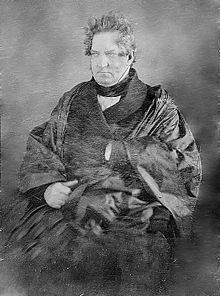James Moore Wayne
| James Wayne | |
|---|---|
 |
|
| Associate Justice of the Supreme Court of the United States | |
|
In office January 14, 1835 – July 5, 1867 |
|
| Appointed by | Andrew Jackson |
| Preceded by | William Johnson |
| Succeeded by | Seat abolished |
| Chair of the House Foreign Affairs Committee | |
|
In office February 22, 1834 – January 13, 1835 |
|
| Preceded by | William Archer |
| Succeeded by | John Mason |
| Member of the U.S. House of Representatives from Georgia's at-large district |
|
|
In office March 4, 1829 – January 13, 1835 |
|
| Preceded by | George Gilmer |
| Succeeded by | Jabez Jackson |
| Personal details | |
| Born |
1790 Savannah, Georgia, U.S. |
| Died | July 5, 1867 (aged 76–77) Washington, D.C., U.S. |
| Political party | Democratic |
| Other political affiliations |
Jacksonian |
| Education | Princeton University (BA) |
James Moore Wayne (1790 – July 5, 1867) was an Associate Justice of the Supreme Court of the United States and was a United States Representative from Georgia.
Born in Savannah, Georgia, Wayne was the son of Richard Wayne, who came to the U.S. in 1760 and married, on September 14, 1769, Elizabeth Clifford (? - 1804), born in Charleston, S.C. Wayne graduated from Princeton University in 1808, read law to be admitted to the bar in 1810, and began his practice in Savannah. He served in the United States Army during the War of 1812, from 1812 to 1815, as an officer in the Georgia Hussars. He served in the Georgia House of Representatives from 1815 to 1816. He then served as the mayor of Savannah from September 8, 1817 to July 12, 1819, thereafter returning to private practice in Savannah until 1824.
He then served as a judge, first of the Court of Common Pleas in Savannah, Georgia from 1819 to 1824, and then of the Superior Court of Georgia from 1824 to 1829, until he was elected as a Jacksonian to the United States House of Representatives from March 4, 1829, to January 13, 1835. He resigned to accept the appointment as an Associate Justice to the Supreme Court. He was nominated by President Andrew Jackson on January 6, 1835, to a seat vacated by William Johnson, and was confirmed by the United States Senate on January 14, 1835, receiving his commission the same day. He served on the court from January 14, 1835 to his death on July 5, 1867. He favored free trade, opposed internal improvements by Congress (except of rivers and harbors), and opposed the rechartering of the United States Bank.
...
Wikipedia
